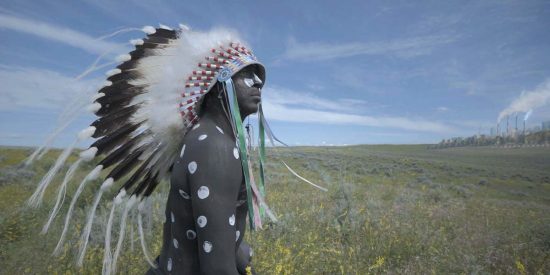TIFF 2020 Review: Inconvenient Indian
“The truth about stories is, that’s all we are… So you have to be careful of the stories you tell, and the stories you’re told,” Thomas King narrates in the beginning of Michelle Latimer‘s new documentary Inconvenient Indian. Inspired by his book of the same name, this documentary aims to question our perceptions of the history we’ve been taught, the legends we have learned about, and the difficult truth when it comes to the treatment of Indigenous peoples in North America.
Also at TIFF with the television series Trickster, director Michelle Latimer uses a variety of techniques – reenactments, archival footage, visual media, and interviews – in order to create this compelling work. Interspersed throughout is voice over from the aforementioned King, who pieces together the legend of the coyote and the duck, an allegory for the European settlers taking increasingly more from the Native people of North America. The colonial systems still in place mean that Indigenous peoples are still being removed from their communities, their lands and shamed for their culture.
With the Hollywood machine portraying the Indian as a person to be feared, and even early documentary works showing them as primitive, the general populous has been served a multitude of misconceptions in popular culture. Latimer breaks these visual stereotypes by telling new stories of modern Indigenous people and how they are trying to reclaim their history and culture from being erased. Steven Lonsdale is a modern hunter (warning there is vivid depiction of hunting methods shown) who feeds those in his community. Kent Monkman is a visual artist who tells the stories of colonization and residential schools through his art. Filmmaker Alethea Arnaquq-Baril brings focus to the art of tattooing as well as telling Inuit stories on screen. There are many more examples, but through this generation, they are using new voices to revitalize and reclaim tradition and tell their stories, though this is still often me with resistance.
Latimer’s often beautifully shot documentary is an important work spanning decades to show the atrocities against the Indigenous peoples in North America and the ramifications that still exist from those actions. History and reality are not always equivalent and as we attempt a paradigm shift to correct our existing societal imbalances it is imperative to remember that we are not innocent. Works like this mean that ignorance is no longer a defence, and as Thomas King notes at the end, what we do with this information is what will really matter.











